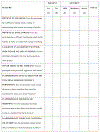The Frontal Behavioral Battery: A Measure of Frontal Lobe Symptoms in Brain Aging and Neurodegenerative Disease
- PMID: 34366351
- PMCID: PMC10731583
- DOI: 10.3233/JAD-210446
The Frontal Behavioral Battery: A Measure of Frontal Lobe Symptoms in Brain Aging and Neurodegenerative Disease
Abstract
Background: Approximately 90%of persons living with dementia experience behavioral symptoms, including frontal lobe features involving motivation, planning, social behavior, language, personality, mood, swallowing, and gait.
Objective: We conducted a two-stage study with a development sample (n = 586) and validation sample (n = 274) to evaluate a brief informant-rated measure of non-cognitive features of frontal lobe dysfunction: the Frontal Behavioral Battery (FBB).
Methods: In the development sample, internal consistency, principal factor analysis, and correlations between the FBB and outcomes were evaluated. In the validation sample, we examined (a) FBB scores by diagnosis, (b) known-group validity by demographics, subjective complaints, and dementia staging, and (c) correlation between FBB and MRI volumes. Receiver operator characteristic curves assessed the ability of the FBB to discriminate individuals with frontal lobe features due to a neurodegenerative disease.
Results: The FBB characterized 11 distinct frontal lobe features. Individuals with dementia with Lewy bodies and frontotemporal degeneration had the greatest number of frontal lobe features. Premorbid personality traits of extroversion, agreeableness, and openness were associated with fewer frontal lobe behavioral symptoms, while subjective cognitive complaints were associated with greater symptoms. The FBB provided very good discrimination between individuals with and without cognitive impairment (diagnostic odds ratio: 13.1) and between individuals with and without prominent frontal lobe symptoms (diagnostic odds ratio: 84.8).
Conclusion: The FBB may serve as an effective and efficient method to assess the presence of non-cognitive symptoms associated with frontal lobe dysfunction, but in a brief fashion that could facilitate its use in clinical care and research.
Keywords: Alzheimer’s disease; behavior; dementia; dementia with lewy bodies; frontal lobe; frontotemporal degeneration; mild cognitive impairment.
Figures


Similar articles
-
Correlated patterns of neuropsychological and behavioral symptoms in frontal variant of Alzheimer disease and behavioral variant frontotemporal dementia: a comparative case study.Neurol Sci. 2016 May;37(5):797-803. doi: 10.1007/s10072-015-2405-9. Epub 2015 Nov 14. Neurol Sci. 2016. PMID: 26573591
-
Why do patients with neurodegenerative frontal syndrome fail to answer: 'In what way are an orange and a banana alike?'.Brain. 2015 Feb;138(Pt 2):456-71. doi: 10.1093/brain/awu359. Epub 2014 Dec 16. Brain. 2015. PMID: 25518957 Clinical Trial.
-
White matter hyperintensity distribution differences in aging and neurodegenerative disease cohorts.Neuroimage Clin. 2022;36:103204. doi: 10.1016/j.nicl.2022.103204. Epub 2022 Sep 16. Neuroimage Clin. 2022. PMID: 36155321 Free PMC article.
-
Neurodegenerative disorders of the human frontal lobes.Handb Clin Neurol. 2019;163:391-410. doi: 10.1016/B978-0-12-804281-6.00021-5. Handb Clin Neurol. 2019. PMID: 31590743 Review.
-
Emotional and behavioral symptoms in neurodegenerative disease: a model for studying the neural bases of psychopathology.Annu Rev Clin Psychol. 2014;10:581-606. doi: 10.1146/annurev-clinpsy-032813-153653. Epub 2014 Jan 15. Annu Rev Clin Psychol. 2014. PMID: 24437433 Free PMC article. Review.
References
-
- Alzheimer Association (2021) 2021. Alzheimer’s Disease Facts and Figures. https://alz.org/alzheimers-dementia/facts-figures. Accessed on 7 April 2021.
-
- World Health Organization (2020) https://www.who.int/news-room/fact-sheets/detail/dementia. Accessed on 7 April 2021.
-
- Khan S, Mihailidis A, Taati B, Mihailidis A (2018) Detecting agitation and aggression in people with dementia using sensors-A systematic review. Alzheimers Dement 14, 824–832. - PubMed
-
- Holst A, Skär L (2017) Formal caregivers’ experiences of aggressive behaviour in older people living with dementia in nursing homes: A systematic review. Int J Older People Nurs 12, 1–12. - PubMed
-
- Galynker II, Roane DM, Miner C, Feinberg TE, Watts P (1995) Negative symptoms in patients with Alzheimer’s disease. Am J Geriatr Psychiatry 3, 52–59. - PubMed
Publication types
MeSH terms
Grants and funding
LinkOut - more resources
Full Text Sources
Medical

